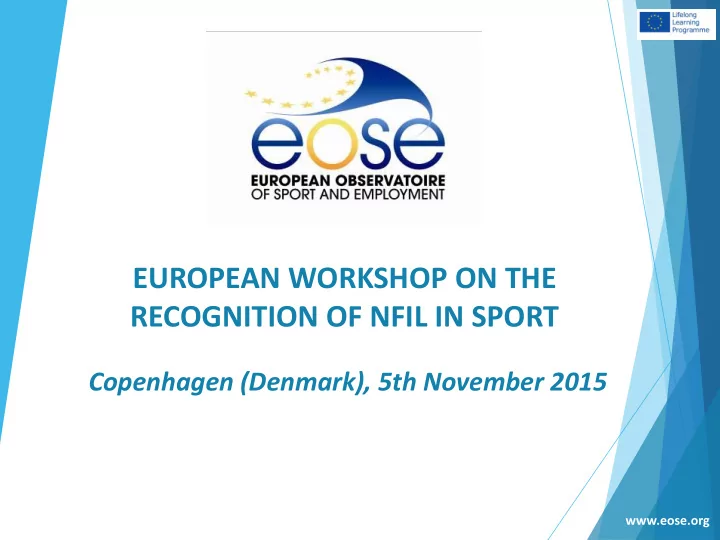

EUROPEAN WORKSHOP ON THE RECOGNITION OF NFIL IN SPORT Copenhagen (Denmark), 5th November 2015 www.eose.org
Keynote presentation 2 Ben Gittus, EOSE Services State of play at EU level and existing tools Discussing recognition and validation of non- formal and informal learning www.eose.org
Vocational Education and Training in Europe Launched in 2002, the Copenhagen process aims to improve the performance, quality and attractiveness of vocational education and training (VET) through enhanced cooperation at European level. The Bruges Communiqué provides long-term strategic objectives for European cooperation in VET for the period 2011-20. Education and Training 2020 EU Funded projects Leonardo/ Erasmus+ www.eose.org
EU Tools for VET Member States, with the social partners, have established common European tools and principles namely the: European qualifications framework (EQF); the European credit system for VET (ECVET); Europass; European quality assurance framework for VET (EQAVET); principles and guidelines for identifying and validating non-formal and informal learning; principles on lifelong guidance and counselling. www.eose.org
NFIL Definitions Informal learning - learning resulting from daily activities related to work, family or leisure. it is not organised or structured in terms of objectives, time or learning support. informal learning is in most cases unintentional from the learner’s perspective. Non-formal learning - learning embedded in planned activities not explicitly designated as learning (in terms of learning objectives, learning time or learning support). non-formal learning is intentional from the learner’s point of view. www.eose.org
Rationale for policy focus EU and National Government focus Competitiveness Increased mobility Lifelong learning Employability Innovation Comparability and transparency Competitive advantage for businesses Training strategies Career planning Entrance to education www.eose.org
Key milestones at EU level 2002: The Copenhagen process: enhanced European cooperation in vocational education and training 2004: European principles for the identification and validation of non-formal and informal learning. 2008: Establishment of the European Qualifications Framework for lifelong learning 2009: European Guidelines for validating non-formal and informal learning 2012: Council recommendation of December 2012 on the validation of non-formal and informal learning, which calls on Member States to put validation arrangements in place by 2018. 2014: European inventory on validation of NFIL, Country Reports www.eose.org
European Guidelines For validating non-formal and informal learning Effective practice Quality assurance National standards and learning outcomes National qualifications frameworks Formal education Private sector companies Voluntary sector Assessment methods www.eose.org
European Inventory Country Reports National perspective Government policy State of play Awareness raising Validation methods HE and VET sector Examples and case studies www.eose.org
Recognition and validation of NFIL Recognition (identification) records and makes visible the individuals learning outcomes. This does not result in a formal certificate or diploma, but may provide the basis for such recognition Validation is based on the assessment of the individual’s learning outcomes and may result in a certificate or diploma www.eose.org
NFIL in volunteering Volunteering experiences generate knowledge, skills and wider competences that often remain invisible. Recognition can enhance: Jobs and employability Gain recognition in the sector Encourage quality and professionalism Develop skills and competences Recognition and reward Transfer to other sectors Help social and economic integration of disadvantaged groups by demonstrating abilities and achievements Youth volunteering - Youthpass – outcomes of personal growth and development Role of voluntary sector organisations www.eose.org
NFIL in formal education Validating non-formal and informal learning is a major challenge to national education systems How integrated in to formal curriculum and assessments Learning achievement seen to be matched to time spent in tuition Cutting corners? Issues of trust, confidence, quality assurance Administration, cost Rigorous systems needed www.eose.org
Assessment methods Debate Declarative methods Interview Observation Portfolio Presentation Simulation Tests www.eose.org
Building sector knowledge and solutions for NFIL Interview with EOSE members on use of European tools EOSE NFIL survey, collecting of good practice European workshop Discussion at sector level Sector at forefront of VET developments www.eose.org
Practical example UK Fitness sector Validation, known more commonly as Recognition of Prior Learning (RPL) At national level, regulatory arrangements are in place, as well as a UK-wide Quality Code for the HE sector, which includes a mandatory expectation relating to assessment and RPL. RPL is understood to refer to recognition of prior non-formal and informal learning. In relation to the qualifications framework, RPL can lead to the award of units or full qualifications. Application to Register of Exercise Professionals (REPs) Experience and informal training Provisional status - one year to gain qualification Training provider Test Centre RPL process Route to qualification and full REPs status through validation of NFIL www.eose.org
Conclusion The importance to Europe of skilled and knowledgeable citizens extends beyond formal education to learning acquired in non- formal or informal ways. Citizens must be able to demonstrate what they have learned in order to use this learning in their career and for further education and training. There must be systems which identifies, documents, assesses and certifies / validates all forms of learning. This is what the EU has called upon Member States to put in place by 2018. Lay foundations for sharing good practice and working towards common principles for the sector www.eose.org
Recommend
More recommend